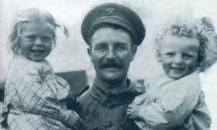Frederic Manning, son of Sir William Patrick Manning (1845-1915) and Nora Manning, was born in Sydney and educated partly at Sydney Grammar School, but mainly at home by private tutors because of poor health caused by asthma. With his tutor, Arthur Galton, he visited England for eighteen months at the age of sixteen. Manning returned briefly to Australia, but went back to England where he lived with Galton and began to establish himself as a 'man of letters'. Manning published three volumes of poetry and a collection of prose while acting as a reviewer for the Spectator, attracting the praise of writers such as E. M. Forster, T. E. Lawrence and Ezra Pound. He also contributed an introductory essay to an edition of Charlton's seventeenth-century translation Epicurus's Morals (1926).
Manning served in World War I, experiencing battle in France during 1916. He was later commissioned second lieutenant, but resigned due to ill health. Manning's experience of war gave him the material for the novel for which he is most admired. In 1929 The Middle Parts of Fortune was published under the pseudonym 'Private 19022'. It is one of few novels that explore World War I from the point of view of an enlisted man and accepts that war is an inevitable part of human behaviour. The novel attracted praise from many writers, including Ernest Hemingway and Arnold Bennett. An abridged version was published a year later, for which much coarse language was removed from the first version. Despite the initial praise, Manning's work received little attention from English critics in the following decades. It was virtually unknown in Australia.
Manning died of pneumomia in 1935. The unexpurgated edition of The Middle Parts of Fortune was re-published in 1977 and several biographies were written in the 1980s and 1990s. In 2000, Manning's novel was published in Australia for the first time, demonstrating a resurgence of interest in the novel.
 6138127085705033147.jpg
6138127085705033147.jpg